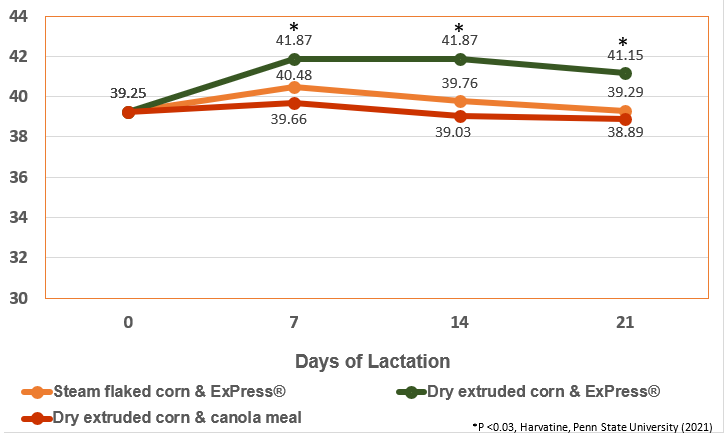Increase Milk Production in Dairy Cows

A challenge many producers face with their dairy cows is deciding which ingredients to feed them. Is it possible to improve the performance of dairy cows using the right ingredients? The answer is YES!
Previously, I discussed how Hi-Gel™ Corn is a highly digestible source of rumen degradable protein and energy for dairy cows. The cow uses these nutrients to produce milk. Due to Hi-Gel™ Corn’s high degree of starch gelatinization – a function of heat and pressure that break-down the starch molecules – it is easier for the rumen microbes to breakdown and transform the starch into a useable energy and protein source to support milk production. Previous work shows that dry Hi-Gel™ Corn is 19% more readily digestible in the cow’s rumen than steam-flaked corn.
In a recent feeding trial conducted at Penn State University, the effect of feeding Hi-Gel™ Corn on dairy milk production was measured. The objective of the study was to evaluate performance in dairy cattle fed diets with Hi-Gel™ Corn in combination with ExPress® soymeal. This was compared to a diet with steam flaked corn and ExPress® meal. A control diet without ExPress® meal was also evaluated. This study looked to build on the previous data and measure its effects on production and performance of cows fed dry Hi-Gel™ Corn and ExPress® soymeal versus steam flaked corn.

As illustrated in the graph above, cows fed Hi-Gel™ Corn in combination with ExPress® soymeal produced, on average, 1.8 kg more milk than the cows fed steam flaked corn in combination with ExPress® soy meal. Furthermore, when ExPress® soymeal was replaced by commodity canola meal, milk production was reduced. Additionally, there were no significant differences in the dry matter intake across all diets. In cows fed the Hi-Gel™ Corn diet, milk production remained consistent and did not affect changes to milk protein or milk fat levels throughout the 21-day period. This was not the case in cows fed the steam-flaked corn and canola diets, which showed slight decreases overtime in milk production.
With the right ingredients, improving the performance of dairy cows is possible. So how does this translate to financial benefits? We will discuss that next week.



